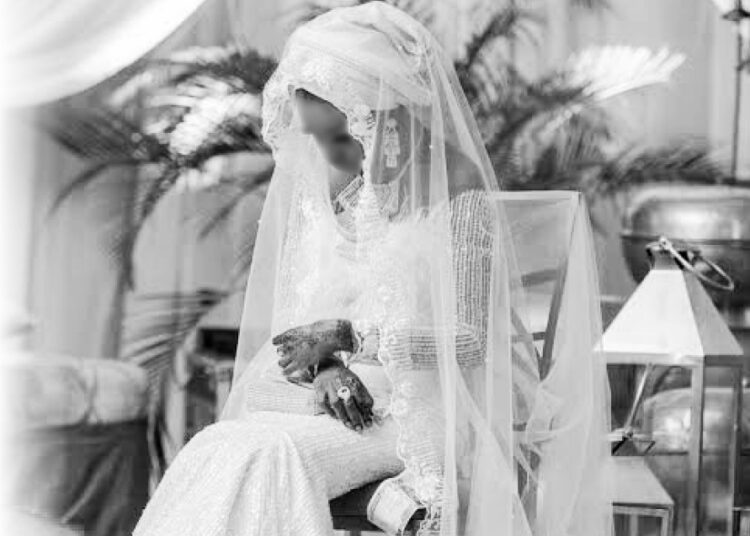The prevailing economic difficulties may affect plans of intending couples while they are increasingly debating who should cover the expenses for wedding ceremonies and household fittings.
On the one side of the debate is what religion dictates and on the other side is what has been the tradition in covering expenses for marriage ceremonies and preparing young couples for a new life.
Brides-to-be and their families, particularly in Northern Nigeria, who have traditionally taken on the burden of furnishing their future homes and paying for wedding receptions are now looking for alternative options to lessen the burden.
They are, however, also looking for the right religious interpretation on what the roles of prospective brides and grooms should be when it comes to covering marriage expenses.
LEADERSHIP Weekend reports that the culture of burdening the bride and her family with weight wedding expenses is well entrenched in most Northern states. The weight of the burden is just as heavy with families with low incomes as it is with middle income earners and those on the higher end of the income scale.
And as the economic challenges bite harder, families of couples that are about to wed are devising different ways to foot the bill.
In the case of Abdullahi Sani’s family (not real name), from Uke in Nasarawa State, marrying off his daughter, Hafsat, was challenging because of modest means.
LEADERSHIP Weekend came across his family’s story and learnt that a decision was made to send siblings of the bride-to-be to find menial jobs.
One of the prospective bride’s sister, Maryam, ended up as a maid in Abuja, Nigeria’s capital city, with all the money she earned going towards paying for a wedding that wasn’t hers.
LEADERSHIP Weekend also gathered that their story was not uncommon in their community as it was the only way for the families of many young women to pay for their weddings.
At Boli village in Wanka district in Kirfi Local Government Area of Bauchi State, for instance, a groom whose marriage is billed for contraction seven days to the commencement of the forthcoming Ramadan fast, Habibu Musa, told our reporter that he had already given a dowry of N80, 000 to the bride, saying that religion lays emphasis on the dowry.
Musa, a tailor, said he is now preparing two boxes that would contain clothing materials and other wear and cosmetics for the bride for conveyance to her family.
He told our reporter that some groom from well-to-do families give up to N100, 000 as dowry, but that it is very rare in their village set-up.
The groom also disclosed that he had prepared two boxes of moderate-cost clothing materials, other wear, cosmetics and others for the bride, which come to between N180, 000 to N200, 000, unlike in urban areas where grooms propose five to six boxes of high quality clothes and wears.
Musa’s proposed bride, Nabila Yusuf, when confronted with the issue, said she was not responsible for any provisions for her marriage, as everything lies with her parents.
She explained that her father was responsible for the provision of furniture for her matrimonial room which, she revealed, normally cost between N200, 000 and N250, 000 in their locality.
According to Nabila, what a bride normally does is organise the entertainment for the get-together of her mates and colleagues after collecting small monetary contributions from some of her friends, a tradition in matrimonial celebrations.
She further explained that such contributions from friends is done after the marriage is contracted.
For middle-income families, the cost of marrying off a daughter could run into tens of millions of Naira, irrespective of whether times are good or bad.
In fact, some fathers sell long-held property not only to save the family from shame but to give their daughters befitting weddings.
A storekeeper of a popular bridal shop, Mudassir Stores in Wuse 2, Abuja, Abdulsamad Ilyasu, told LEADERSHIP Weekend that in their store, it is the groom that does most of the spending and, on average, spends from N4 million to N6 million depending on the depth of their pockets.
A husband-to-be, Ibrahim Bashir, who is a commodity dealer in Kano, spoke to LEADERSHIP Weekend on his experience so far in planning his wedding.
Bashir says he was asked to undergo some processes that included paying a visit to the parents of his fiancée where he was expected to pay what is called na gani ina so. In this visit he is expected to pay some amount of money to the bride’s parents.
“When I went and paid the visit to the parents and gave some money, I was asked to bring the lefe which I already had in place. I bought about 20 textile materials, cosmetics, bags and shoes and three boxes in which they were placed.
“When this was taken to their house, they fixed the date for the marriage and asked me to provide a dowry of N100,000, which I did.
“I had alrerady got the house we are going to live in ready before time. Her parents will go and see the place and furnish it with a bed, chairs and other furniture. They will buy all the domestic utensils required in a house.
“We agreed with my wife-to-be that we are going to have a dinner party, but she insisted she wanted to do some form of celebrations that include Kauye Day and others, which I did not accept. We came to the conclusion that it is only the dinner that we will celebrate and I will provide the money for the venue and the food,” he said.
A Bride Shouldn’t Be Burdened With Expenses – Dr Usman
The chief imam of Gadon Kaya, in Kano city, Dr Abdallah Usman explained that it is the responsibility of the man getting married to provide for the needs of his wife and not her parents.
However, there are innovations that force the parents of the bride to buy domestic utensils and furniture for their daughter and even food when she is getting married.
He said this is far from what the religion instructs.
“It is rather the responsibility of the husband to provide for the woman he is going to marry. It is his responsibility to feed her, clothe her, provide her with shelter, educate her, and cater for her health and others.
“On the issue of marriage in Islam, when a man sees a lady he is interested in marrying, he starts by seeking the consent of her parents to meet and talk to her.
“When they agree with one another and accept to engage in wedlock, she will be expected to express her acceptance.”
He said, “When the time of the marriage comes, it is the husband, or the groom, that is going to be responsible for everything about the marriage. He will pay the dowry and the lady becomes his wife after pronouncing it before the witnesses, her parents or guardians, as well as his parents or guardians.
“All her responsibilities are now transferred to him. It is his responsibility to provide shelter, food, healthcare, clothing, education and others in his position as her husband. “
According to him, it is therefore the man’s responsibility to provide furniture, including the bed, mattress, chairs and other household items the wife will need in the house of the husband.
“However, our people have changed this by introducing a culture and tradition that takes away those responsibilities from the potential husband and placed them on the parents of the bride.
“They make the parents of the bride provide the bed, mattress, chairs, domestic utensils and others. They even buy what they call gara, meaning food items, and take to the house of the husband. This is not the Sunna of the religion but culture.”
Gadon Kaya said, “Contrary to this, it is the responsibility of the husband in Islam to provide all the needed things during the wedding. This is still the practice in Muslim communities across the world, like Saudi Arabia, Sudan, Egypt and others.“
They are still on the Islamic prescribed system. It is only the bride that is given to the groom; all other things are his responsibility and not that of her parents.
“Another thing is the issue of the tradition called lefe (clothing, like dresses, shoes, bags, cosmetics, jewelry, boxes, undies and others); actually this has basis in the religion. It is the responsibility of the husband to clothe his wife, so this could be accepted.”
“It is just that, as per the religion, it is not necessarily done all at once; but is done continuously from time to time during the marriage period.
The cleric further said it is out of order to claim that lefe is proscribed.
“What would your wife wear if you don’t buy them for her? Is it her father that is supposed to buy her the clothes that she will wear in your house? How could you be expecting that that your matrimonial bed be provided by her father? How could her parents be the ones to buy the plates and cutlery you are going to use with your wife? Do these make sense?” he queried.
Dr Usman challenged those advocating lefe proscription to provide reference from religious jurisprudence where the parents of the bride are asked to provide furniture for their daughter.
“There is none. There is nowhere Allah or the Prophet has given the instruction for bride’s parents to buy furniture.
“The wife of the Prophet Muhammad, PBUH, Aisha, was taken to her husband’s place without any such things. Nothing was provided by her parents. It was the Prophet that did everything as the husband. He provided the house, the utensils, the food and others, but today you see a man just having an empty house and waiting for the parents to not only give him a wife, but to provide for all the domestic requirements.
“This is wrong; this is what the Sharia says. It is only the bride that is given to the groom and the responsibility of providing all her needs are on him.”
“On the issue of walimat, it is Sunna to do it when the marriage knot has been tied. It is the prophet that gave the instruction that you can do walimat even if it is by sharing dates,” he explained.





